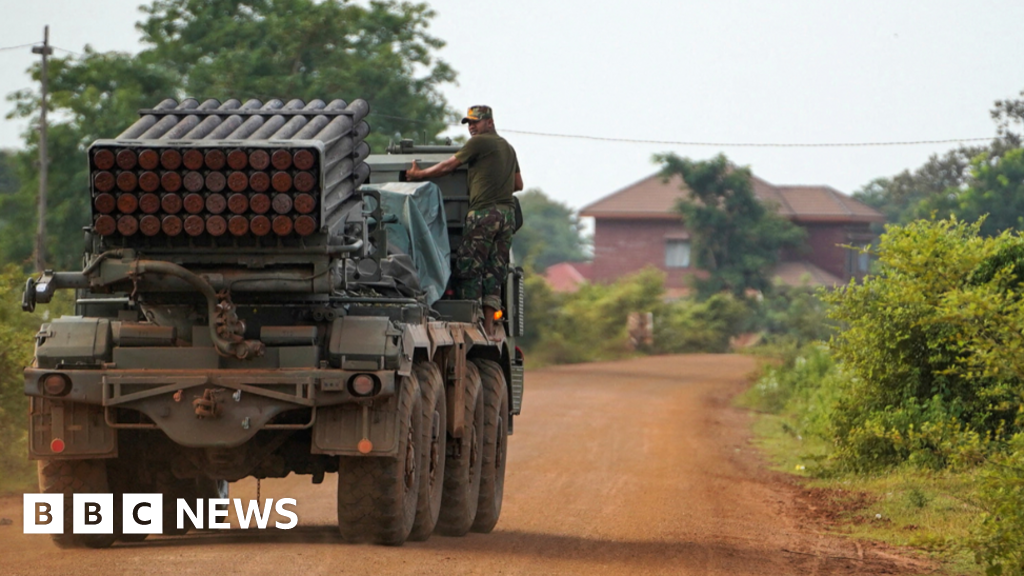 |
|
The article details the complexities of a border conflict between Thailand and Cambodia, highlighting the attempted intervention of former US President Donald Trump. Trump, using his Truth Social platform, announced that he had contacted the leaders of both nations, urging an immediate ceasefire. He further claimed that both countries had agreed to meet and work towards a lasting peace. This declaration, however, stands in stark contrast to the realities on the ground. While both nations expressed gratitude to Trump for his concern and efforts, their underlying positions remained unchanged, and shelling continued along the border even after Trump's pronouncements. Cambodia, facing a disadvantage in military strength and having already proposed a ceasefire, readily accepted Trump's offer. The Cambodian Prime Minister, Hun Manet, explicitly stated his agreement to an immediate and unconditional ceasefire, emphasizing the potential for Trump's mediation to save lives. Thailand, on the other hand, maintained its stance that dialogue with Cambodia must precede any ceasefire. The Thai foreign ministry, through Acting Prime Minister Phumtham Wechayachai, expressed gratitude for Trump's concern but insisted on seeing sincere intention from the Cambodian side before implementing a ceasefire. This divergence in positions underscores the deep-seated issues fueling the conflict. The article also provides a grim reminder of the human cost of the conflict, citing that at least 33 soldiers and civilians have been killed, and thousands of Thai and Cambodian nationals have been displaced since the fighting began on July 24th. The situation highlights the difficulty of achieving peace in a conflict where historical tensions, territorial disputes, and power dynamics play significant roles. Trump's attempt at mediation, while seemingly well-intentioned, appears to have had limited immediate impact on de-escalating the violence or bridging the gap between the two nations' positions. The continued shelling despite Trump's announcement paints a picture of a complex and intractable conflict that requires more nuanced and sustained diplomatic efforts.
The core of the issue appears to be a difference in strategic positions. Cambodia, arguably in a weaker position militarily, seems keen to accept any avenue that might lead to a cessation of hostilities. Their acceptance of Trump's proposed ceasefire aligns with this pragmatic approach, seeking to minimize further losses of both personnel and equipment. The Cambodian Prime Minister's statement explicitly welcoming Trump's mediation as a means to protect lives underscores this urgency. Thailand's stance, however, is more cautious and conditional. Their insistence on prior dialogue with Cambodia suggests a desire to address the underlying causes of the conflict before committing to a ceasefire. This could involve seeking assurances about future border incursions, resolving disputed territorial claims, or addressing other grievances that fuel the tensions. The Thai foreign ministry's emphasis on 'sincere intention' from the Cambodian side indicates a level of distrust and a need for verifiable commitments before agreeing to halt military operations. This difference in approach highlights the contrasting perspectives and priorities of the two nations. Cambodia is focused on immediate relief from the ongoing violence, while Thailand is prioritizing a longer-term resolution of the underlying issues. Trump's attempt at mediation, while perhaps intended to be a quick fix, may have inadvertently exposed these underlying differences, making a lasting solution even more challenging to achieve. The effectiveness of any mediation effort depends on a thorough understanding of the root causes of the conflict and a willingness from both sides to compromise and engage in constructive dialogue. Without these elements, even the intervention of a powerful external actor like the former US President is unlikely to produce a sustainable peace.
The article also subtly raises questions about the nature of Trump's intervention. His announcement via Truth Social, a platform he owns and controls, suggests a desire to publicly claim credit for a diplomatic breakthrough. This raises concerns about whether the intervention was motivated primarily by a genuine desire to resolve the conflict or by a desire to enhance his own political image. The timing of the announcement, coinciding with a private visit to his Scottish golf courses, further reinforces this perception. The fact that the shelling continued despite Trump's claims of a ceasefire agreement raises doubts about the accuracy and reliability of his pronouncements. It also highlights the limitations of relying on social media as a primary means of diplomatic communication. Complex international conflicts require careful negotiation, nuanced understanding, and sustained engagement. A single phone call and a public announcement on social media are unlikely to be sufficient to address the underlying issues and achieve a lasting peace. Furthermore, the article implicitly criticizes the lack of follow-up or concrete action to support Trump's initial intervention. Simply making a phone call and issuing a statement is not enough to resolve a complex conflict. Effective mediation requires ongoing engagement, the establishment of clear communication channels, and the provision of resources to support peacebuilding efforts. The article's concluding message is a cautionary one, emphasizing the need for more nuanced and sustained diplomatic efforts to address the conflict between Thailand and Cambodia. While Trump's intervention may have been well-intentioned, it ultimately fell short of achieving a meaningful breakthrough, highlighting the complexities and challenges of international conflict resolution.
Source: Thailand and Cambodia thank Trump for mediation, but shelling continues
